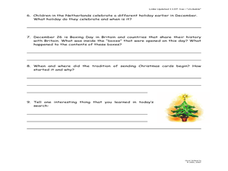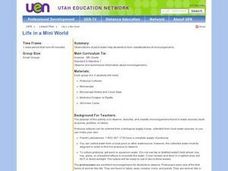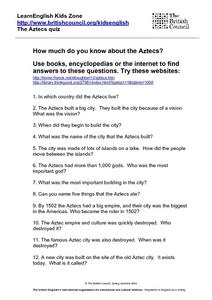Curated OER
Creating a Classification System
Students create classification system for Arctic-dwelling animals, the Arctic hare in particular.
Curated OER
Microorganism Multiplication
Sixth graders conduct experiments with yeast to study characteristics of microorganisms. They, working is small groups, change the variables in the experiments and note the results which they later discuss as a class.
Curated OER
Used To or Be/Get Used to Exercise
For this correct grammar usage worksheet, students read incomplete sentences and complete them using used to plus infinitive, be used to plus object or verb plus -ing, or get used to pus object or verb plus -ing. Students circle the 10...
Curated OER
Diversity of Life
Students identify the difference between eukaryote and prokaryotes and examine the structure of bacteria. For this bacteria lesson students examine the different ways that bacteria are classified through an activity.
Curated OER
Pond Life Identification Kit
Students explore ecology and biodiversty. They use the wet-mount procedure to make several slides to view using the microscope and draw what they see.
Curated OER
Feudalism
Young scholars have tournaments in teams after learning information about The Middle Ages. In this Middle Ages lesson plan, students learn that tournaments are mock battles, but that they will have these battles by answering questions in...
Curated OER
Classification Schemes
Students place organisms into the correct classification and justify their reasoning. They must include all objects and have a reason for their decisions.
Curated OER
COMPARE SOILS BY GROWING PLANTS
The student will identify the difference in the rate of plant growth in three soils that vary in organic matter.1. Obtain three to four flowerpots, different types of soil, a record chart, three to five beans for each pot, and water....
Curated OER
The Present Perfect
In this present perfect learning exercise, students answer 25 questions using the present perfect verb form. The questions are either multiple choice and fill in the blank.
Curated OER
The Present Perfect
In this present perfect verbs practice learning exercise, students respond to 10 multiple choice, 5 fill in the blank, and 10 short answer questions.
Curated OER
The Middle Ages
Students read books about the Middle Ages. They discuss characteristics of the Middle Ages. In groups, students construct a castle and draw a map to scale. Pupils create a Venn diagram comparing rules in different countries in the...
Curated OER
Species Diversity and Phylogeny
Students explore the classification system of organisms: taxonomy. They examine prepared slides of Protozoans and record information on a Taxonomy Recording Sheet. Two additional classifying activities are also included in this lesson.
Curated OER
Taxonomy Project
Students act as a taxonomist and, given a certain situation, classify existing organisms.
Curated OER
Christmas Trees and Traditions
In this Christmas worksheet, students research the internet to find facts about Christmas trees and traditions. Students complete 9 short answer questions.
Curated OER
Reality vs. Fantasy
In this reality and fantasy worksheet, students label sentences as either being reality and fantasy, and then complete a Venn Diagram for a dragon and a dinosaur. Students label 10 sentences.
Curated OER
King Mswati
In this famous leaders worksheet, students read a passage about King Mswati and then complete a variety of activities including spelling, cloze, synonym matches, and scrambled sentences.
Curated OER
Life in a Mini World
Sixth graders observe, describe, and classify microorganisms found in water sources. In small groups, they make their own slide, observe the Protozoa under a microscope, and record and classify the microorganisms.
Curated OER
Rain Forest Animals
Students create a book about animal species found only in the Amazon rain forest. They find one species to represent each letter of the alphabet, and write each name on a different piece of paper. They illustrate each page with an...
Curated OER
INDUSTRY AND THE ENVIRONMENT
Seventh graders create a final project called Industry X (which was previously researched in the unit) has plans to build in town. There is a special town meeting scheduled to discuss this matter and allow everyone to express their...
Curated OER
The Aztecs Quiz
In this social studies worksheet, students utilize books, encyclopedias and the internet to find the answers to twelve questions associated with the Aztecs.
Curated OER
Queen Elizabeth
In this famous leaders worksheet, students read a passage about Queen Elizabeth and then complete a variety of in-class and homework activities to support comprehension, including partner interviews, spelling, cloze, synonym matches, and...
Curated OER
Bioluminescent Bewilderment!
Ninth graders investigate the concept of bioluminescent. They break down the word phonetically for correct pronunciation. This is done as a warm up for learning. Then students create a list of the creatures from prior knowledge and...
Curated OER
ABC Animals
In this science worksheet, students match up eight pictures of animals to their names and then guess at the answers to eleven questions about animals.

























